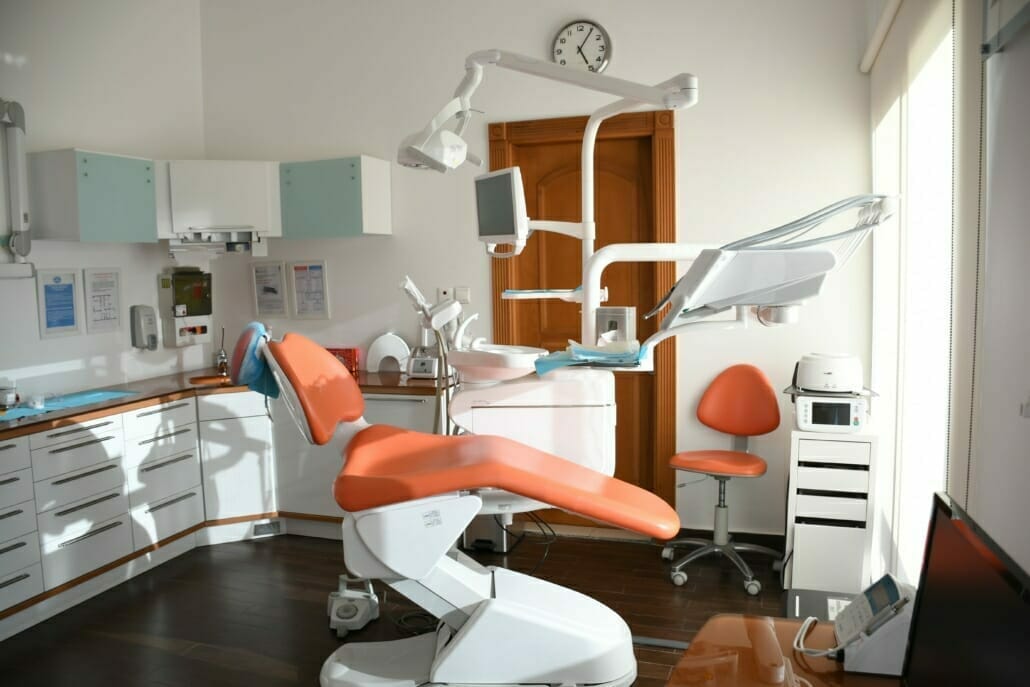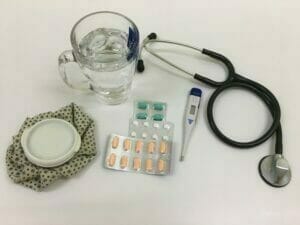7 Facts | How to see a Doctor in Germany

If you’re reading this article, I hope it’s out of curiosity rather than due to illness. However, if you find yourself unwell, let me extend my wishes for a speedy recovery: Gute Besserung! 🙂
In this blog post, we’ll explore what it’s like to visit a doctor and navigate the process of seeking medical care in Germany. We’ll cover topics such as making doctor’s appointments and, of particular interest, finding English-speaking doctors in the country.
# 1 How do I find a GP (general doctor) in Germany?
The German healthcare system has a wide range of doctors available to meet your medical needs. When searching for a doctor in your area, it is recommended to find a general practitioner, “Allgemeinarzt” or “Hausarzt” in German.
If you are not fluent in German, there are many general practitioners who speak English. You can easily find them by conducting a simple Google search using the keywords “Allgemeinarzt Englisch + your city.”
When you feel unwell, your chosen general practitioner will be your primary point of contact. It is important to promptly report any illness to your doctor, especially if it prevents you from going to work. In such cases, the doctor will provide you with a “Krankheitsbescheinigung” or illness confirmation, which verifies your condition. This document is typically required for work-related absences.
Once you receive the illness confirmation from your doctor, it is important to submit it to your employer. Different employers in Germany may have varying requirements regarding when to provide a doctor’s note during your sick leave. Some employers may request the note right at the beginning, while others may only require it from the third day of illness.
To ensure compliance with your employer’s policy, it is advisable to clarify their specific requirements. Regardless of the specific timing, it is crucial to notify your employer when you are unable to work due to illness. Instead of sending an email or a text message, making a personal phone call to inform them is recommended. Taking this proactive approach demonstrates your professionalism and helps you stay on the safe side.

Do I need a referral to see a medical specialist in Germany?
When you fall ill in Germany, the first step is to visit a general practitioner. They will assess your condition and provide a diagnosis. If the issue is severe or beyond the scope of their expertise, they will refer you to a specialist. It is important to note that without a referral, you cannot directly see a specialist.
Obtaining a referral from your GP is generally required to consult a specialist. Additionally, women in Germany typically visit a gynecologist twice a year for regular check-ups. For this, a referral is not necessary. It’s important to be aware that contraception pills are usually not covered by health insurance for individuals above 18 years of age, and the cost of a three-month supply ranges from 20 to 30 Euros.
Moreover, if you are a member of public health insurance in Germany, you are expected to visit a dentist at least once a year. Neglecting regular dental check-ups may result in insurance coverage not extending to dental expenses. Therefore, it is crucial to prioritize regular dental visits.
Though it may not be the most enjoyable experience, maintaining regular health check-ups and following proper healthcare protocols will ultimately yield positive results for your well-being.
# 2 How to find English-speaking doctors in Germany?
Finding English-speaking doctors in Germany is generally quite feasible. In most parts of the country, you can easily locate doctors and specialists who speak English. To begin your search, using search engines like Google or seeking recommendations in expat groups on social media platforms such as Facebook can be helpful.
Moreover, if you are a member of BARMER or TK, two prominent German public health insurance providers, you can contact their service hotlines. Both insurance companies offer English-language services and can provide guidance in finding an English-speaking doctor. They may even assist you in making the appointment, streamlining the process for you.
Another convenient option is to contact your health insurance provider directly. They can help you locate an English-speaking doctor and may even arrange an appointment on your behalf. This straightforward approach ensures a hassle-free experience.
If you reside in Berlin, you can benefit from a dedicated website called doctorberlin.de. This platform specifically caters to individuals seeking doctors in Berlin who can communicate in English, French, Arabic, and various other languages. It simplifies the process of finding a suitable healthcare professional in the city.
With these resources and options at your disposal, you can easily connect with English-speaking doctors in Germany, ensuring effective communication and quality healthcare.

# 2 What is a ‘Gesundheitskarte’, and how to get it?
The Gesundheitskarte, also known as the German health insurance card, is a vital document that confirms your health insurance coverage. It contains personal and health-related information that is securely stored.
It is essential to carry your Gesundheitskarte with you at all times. You will be asked to present your German health insurance card whenever you visit a hospital or see a doctor in Germany. If you happen to forget or misplace it, you can contact your health insurance provider and request them to send coverage confirmation to your doctor. However, it is generally discouraged, and you will still need to provide the physical card for scanning at the doctor’s office afterward.
Your health insurance provider will issue you a health insurance card upon enrollment. It is mandatory for residents in Germany to have health insurance, with approximately 85% of Germans being covered by public health insurance and the remaining individuals opting for private insurance.
# 3 Sick leave in Germany: medium and long-term absence
If you are a German public health insurance system member, your employer will typically provide full salary coverage for up to six weeks during your illness. To be eligible for “sick pay,” you must obtain a confirmation from your healthcare provider stating that you are ill (Krankenbescheinigung). It is also important to maintain communication with your employer while you are sick.
It is recommended to inform your employer about the estimated duration of your absence, allowing them to make necessary arrangements for a temporary replacement if needed. In Germany, it is considered common courtesy to personally call your employer when you are ill rather than sending a text or email. You can send the doctor’s illness confirmation via letter or fax or simply bring it to the office once you have recovered and returned to work.
After six weeks of illness, you may be eligible for sick pay. The government scheme, known as Krankengeld (“public sick pay”), provides a percentage of your income for a maximum duration of 78 weeks.
Are you self-employed? Keep in mind that the process may differ in your case, and sick pay is only available if you have private sick-pay health insurance.

# 4 Do I need to schedule an appointment to see a doctor?
In general, yes, appointments are required, especially when visiting specialists. It’s important to note that wait times for specialist appointments can range from a couple of weeks to a few months. Therefore, it’s advisable to schedule appointments well in advance.
However, in the case of emergencies or if you require a sick leave certificate for your employer, you can visit your general practitioner (Allgemeinarzt) without an appointment during their regular visiting hours, or “Sprechstunde”. Simply contact the front desk and inquire if it’s possible to visit on the same day.
To avoid lengthy waiting times, it’s recommended to call as early as possible in the morning and arrive a little early for your appointment. This way, you can minimize any potential delays and ensure a more efficient visit to your doctor in Germany.

# 6 Will my German private health insurance cover my doctor’s visit?
If you have private health insurance in Germany, the reimbursement process works as follows. After your visit to the doctor, you will receive an invoice for the treatment. Typically, this invoice is issued a few days or weeks after the treatment. It is your responsibility to make the initial payment for this bill.
It’s essential to keep a copy of the invoice for your records. You should then send the original invoice to your private health insurance provider for reimbursement. The reimbursement process usually takes one to three weeks, depending on the terms of your health insurance agreement. Reviewing your contract to understand the coverage provided by your specific plan is important.
When it comes to medication and prescriptions in Germany, you are responsible for paying for them initially. After receiving the prescription from your doctor, you can take it to the pharmacy. Inform the pharmacy that you require a copy of the medication and a receipt for your private health insurance. You will need to make the payment for the medication at the pharmacy.
To claim reimbursement for the medication expenses, send your health insurance provider a copy of the prescription and the payment receipt. They will guide you on the process for reimbursement according to the terms of your private health insurance agreement.
You can expect to receive the reimbursement directly into your German bank account within a few weeks. If you haven’t opened a German bank account yet, it’s recommended to do so in order to facilitate the reimbursement process. Opening a German bank account online is a convenient way to manage your finances while living in Germany.

# 7 Do I need to pay for medicine and treatments with public health insurance?
If you are a member of public health insurance in Germany, such as TK or BARMER, the process of accessing healthcare becomes relatively straightforward.
Once you are insured, you will receive a Gesundheitskarte (German health card). It is crucial to carry this card with you at all times. When you visit a doctor, you will need to present your health card to the receptionist. This card contains your personal and health information, ensuring a seamless registration process.
Public health insurance in Germany typically covers most necessary medical treatments and prescribed medications. However, it is advisable to check the specifics of your health insurance policy to understand the extent of coverage. While many treatments and services are included, certain treatments, such as homeopathic or dental treatments, may have limitations or require additional coverage.
It is worth exploring the details of your health insurance coverage, as you may be pleasantly surprised by the benefits. For example, some health insurance plans provide coverage for complimentary services, such as prescribed free massages for individuals experiencing back pain.
By staying informed about your health insurance coverage and utilizing the services available to you, you can make the most of your public health insurance in Germany and access the necessary healthcare resources when needed.
Does German Health insurance cover vaccinations?
German health insurance typically covers a wide range of vaccinations, including routine and travel vaccinations. Coverage may vary by insurance provider and policy, so checking with your provider for specific details is important. Consult your general practitioner or a vaccination center for expert advice and administration of vaccines. Mandatory vaccinations are required by law in Germany. Stay informed and comply with vaccination requirements to protect public health.






